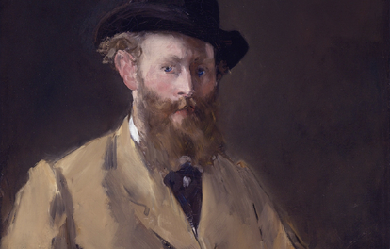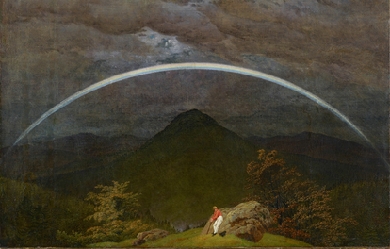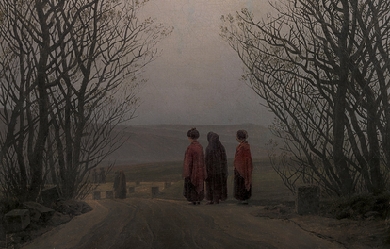
.¿Recuerdas?
Brindo por los imposibles... existen, son así...
¿Recuerdas cuando me mostraste este cuadro? El duque de Orleans exhibiendo a su amante. De Eugene Delacroix. 1825-1826. Es un cuadro hermoso y triste a la vez. Hermosamente ejecutado. Triste por como se siente ella, por la idea de la mujer que reside en él. Triste por su gesto, el de la amante. Triste por la cosificación y por la falta de profundidad en la concepción del ser humano. Es tan triste que puede llegar a ser indignante. Es un cuadro para ver y hablar de él en el día de la mujer. Y cada día. Porque todos y cada uno de estos días que vivimos ahora, alguna mujer en el mundo es tratada como la que vemos aquí. Y los seres humanos no nos deberíamos tratar así.
Tu querías evaluarme. Si tan cierto era que yo amaba los museos de mi ciudad, tenía que conocer este cuadro. Estaba en mi museo favorito. Pero yo, en ese momento, no lo reconocí. Pasaron los meses. Un día, en una visita de disfrute, de las de esos días en los que necesito conectar con la belleza de nuestras obras, tropecé con él. Y no me lo podía creer. Era de dimensiones pequeñas, aún más estremecedor en la realidad que en la imagen de internet. Y de golpe, tú, que ya te habías ido de mi vida, volvías a instalarte en el sillón del salón. A hablar en mi mente de forma inquisitiva, a evaluar si yo realmente estaba cerca de ser quién yo pretendía ser. Logré olvidarme de todo ello para concentrarme en la obra. Fue un rato que agradezco a la vida. Placer puro. Cada rincón, cada detalle, cada quiebre del artista. Una obra para recordar.
Cuando me alejé del cuadro, también te dejaba sentado solo en mi salón. A ratos hay realidades que negamos, cosas que soslayamos y pretendemos que, de alguna manera, no han sucedido. Aún hoy, varios meses después, no te has ido de dentro de mí. Conocerte me marcó el alma. ¿Cómo pudiste llegar hasta allí? ¡Si es que yo hasta diría que ese lugar no existe! ¡Yo no tengo alma! Pero tú te hiciste un hueco en ella y estás allí. Tengo que aceptarlo. Quizás nunca te vas a ir.
Do you remember when you showed me this painting? The Duke of Orleans showing his mistress. By Eugene Delacroix. 1825-1826. It is a beautiful and sad painting at the same time. Beautifully executed. Sad for how she feels in it, for the idea of the woman who resides in it. Sad for her gesture. Sad for the reification and for the lack of depth in the conception of the human being. It is so sad that it can be outrageous. It is a painting to see and talk about on women’s day. And every day. Because each and every one of these days that we live now, some woman in the world is treated like the one we see here. And human beings shouldn’t treat each other like this.
You wanted to evaluate me. If it was so true that I loved the museums of my city, I had to see this painting. It was in my favorite museum. But I, at that moment, did not recognize it. Months passed. One day, on a recognition visit, one of those days when I need to connect with the beauty of our paintings, I bumped into it. And I couldn’t believe it. It was small in size, even more frightening in reality than in the internet image. And suddenly, you, who had already left my life, returned to settle in the armchair in the living room. To speak to me in a questioning way in my mind, to assess if I really was that close to be who I pretended to be. I managed to forget about it all to concentrate on the artwork. It was a while that I thank for. Pure pleasure. Every corner, every detail, every subtlety of the artist. A work to remember.
When I walked away from the painting, I also left you sitting alone in my living room. At times there are realities that we deny, things that we ignore and pretend that, somehow, they have not happened. Even today, several months later, you have not left my mind. Meeting you marked my soul. How could you get there? If it is that I would even say that this place does not exist! I have no soul! But you made a hole for yourself in it and you are there. I have to accept it. Maybe you’ll never leave.








